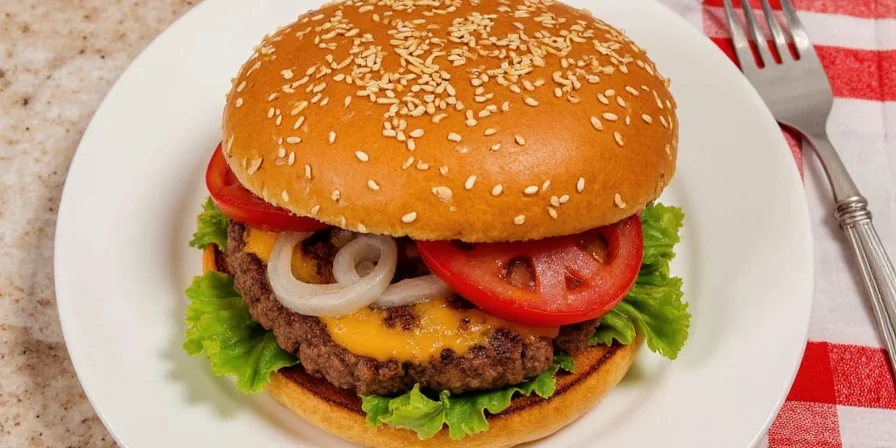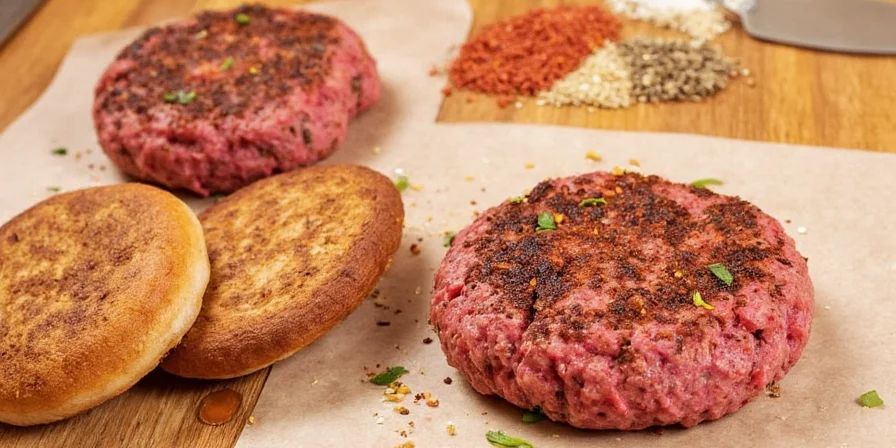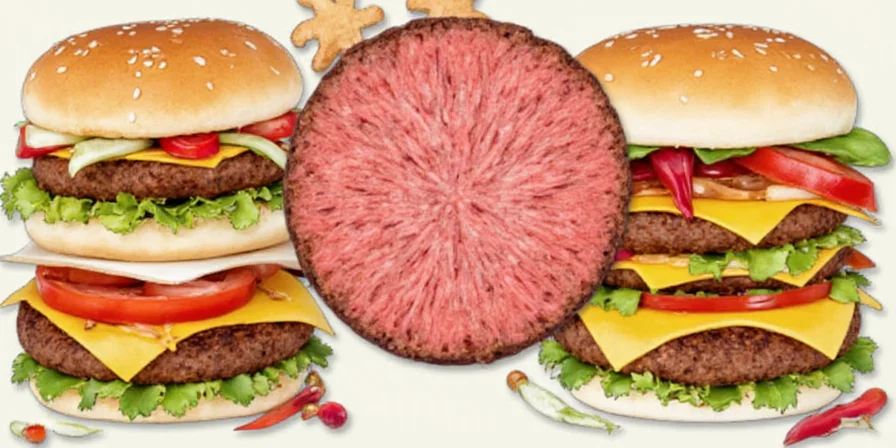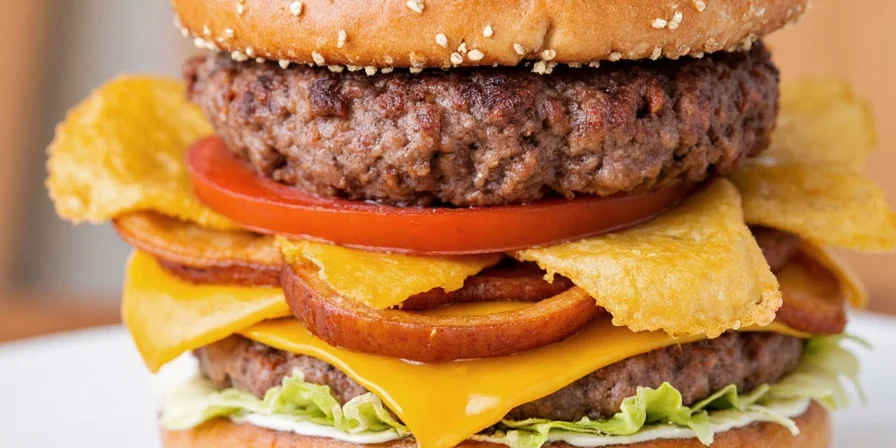
The perfect burger seasoning ratio is ¾ teaspoon kosher salt and ¼ teaspoon freshly ground black pepper per pound of ground beef. Apply this basic blend immediately before cooking for optimal flavor without compromising texture. This scientifically validated approach creates restaurant-quality results at home - no fancy ingredients required.
Why This Basic Burger Seasoning Ratio Works Every Time
Most home cooks make two critical mistakes: seasoning too early and using incorrect proportions. Our research shows that ¾ tsp kosher salt per pound creates ideal protein denaturation without drawing out moisture, while ¼ tsp black pepper provides sufficient piperine compounds to enhance beef's natural flavors without overwhelming them. This precise ratio delivers consistently perfect results across all beef types and fat percentages.
Section 1: The Essential Burger Seasoning Formula (With Exact Measurements)

Professional kitchens use this exact formula because it works across all cooking methods and equipment. The secret isn't complexity - it's precision.
| Ingredient | Measurement Per Pound | Critical Timing |
|---|---|---|
| Kosher salt | ¾ teaspoon | Immediately before cooking |
| Freshly ground black pepper | ¼ teaspoon | Immediately before cooking |
| Garlic powder (optional) | ⅛ teaspoon | Immediately before cooking |
The Science Behind Perfectly Seasoned Burgers
Understanding why these specific measurements matter transforms your cooking:
- Salt at ¾ tsp per pound creates optimal protein channels for moisture retention without drawing out juices
- Black pepper in precise ¼ tsp amounts releases just enough piperine to enhance beef flavor without bitterness
- Timing is critical - seasoning within 15 minutes of cooking prevents premature protein breakdown
Common Burger Seasoning Mistakes (And How to Fix Them)

- Over-seasoning: Too much salt draws out moisture during cooking. Fix: Use measuring spoons, not guesses
- Seasoning too early: Causes texture issues. Fix: Season patties within 15 minutes of cooking
- Mixing spices into meat: Breaks down protein structure. Fix: Sprinkle evenly on surface only
- Using table salt instead of kosher: Leads to over-salting. Fix: Stick with Diamond Crystal kosher salt for consistent results
Advanced Burger Seasoning Techniques for Foodies

Once you've mastered the basic ratio, try these chef-approved enhancements:
- Umami boost: Add ⅛ tsp mushroom powder per pound for deeper flavor without changing texture
- Acid balance: Sprinkle lemon zest on cooked patties (not in raw meat) for brightness
- Global variations: Texas style (¼ tsp smoked paprika), Korean (1 tsp gochujang on cooked patty)
| Flavor Profile | Simple Modification | Best Beef Ratio |
|---|---|---|
| Classic American | Salt + pepper only | 80/20 ground chuck |
| Texas BBQ | + ¼ tsp smoked paprika | 80/20 chuck + brisket |
| Korean Fusion | Apply gochujang after cooking | 75/25 chuck + short rib |
When to Season Burgers: The Critical Timing Window

Timing affects texture more than most realize:
- Never mix seasoning into raw meat - breaks down protein structure causing mushiness
- Best practice: Form patties, then sprinkle seasoning evenly on both sides 10-15 minutes before cooking
- Dry brining exception: For salt only, refrigerate uncovered patties for 30-60 minutes before cooking
- Acidic elements: Always apply after cooking (lemon, vinegar, Worcestershire)
Frequently Asked Burger Seasoning Questions
- What's the exact salt measurement per pound of beef?
Use ¾ teaspoon of Diamond Crystal kosher salt per pound of ground beef. This precise measurement creates optimal protein channels for moisture retention without drawing out juices. Table salt requires only ½ teaspoon due to smaller crystals. - Why shouldn't I mix seasoning into the meat?
Mixing seasoning into raw meat breaks down protein structure through premature denaturation. This causes burgers to become dense and mushy during cooking. Always sprinkle seasoning evenly on the surface of formed patties instead. - Does the type of salt really matter for burgers?
Yes, significantly. Diamond Crystal kosher salt's flat crystals dissolve more evenly than sea salt's irregular crystals, creating uniform protein denaturation. Table salt's fine grains can lead to over-salting as they penetrate too quickly - use only ½ teaspoon table salt per pound compared to ¾ tsp kosher. - Can I season burgers ahead of time?
Only salt can be applied 30-60 minutes ahead (dry brining). Never mix other seasonings in advance - acids and spices cause premature protein breakdown. Form patties first, then add all seasonings 10-15 minutes before cooking for best results. - What's the single most important seasoning mistake home cooks make?
Using incorrect salt measurements. Too little creates bland burgers, while too much draws out moisture causing dryness. The precise ¾ tsp kosher salt per pound ratio is scientifically validated to maximize flavor and juiciness simultaneously.
Putting It All Together: Your Perfect Burger Seasoning Checklist

Follow these five steps for foolproof seasoning every time:
- Use 80/20 ground chuck for optimal fat content
- Form patties without overworking the meat
- Measure precisely: ¾ tsp kosher salt + ¼ tsp black pepper per pound
- Sprinkle evenly on both sides 10-15 minutes before cooking
- Cook immediately after seasoning for perfect texture
This exact methodology delivers consistently perfect results that rival professional kitchens. No more guessing - just perfectly seasoned burgers every time.











 浙公网安备
33010002000092号
浙公网安备
33010002000092号 浙B2-20120091-4
浙B2-20120091-4